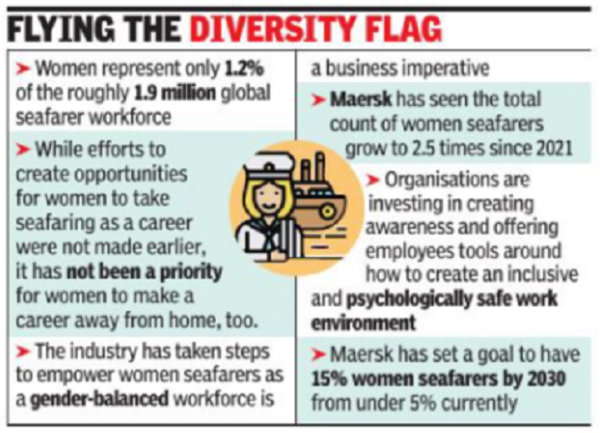[ad_1]
In India, Maersk said the total count of women seafarers has grown 2.5 times since 2021. The proportion of Indian women has risen to 34% of the total global women seafarers in Maersk, from 20% in 2021. India’s intake made up more than 60% of all women cadets onboarded by Maersk in 2022.
Anchored in the awareness that a gender-balanced workforce is a business imperative, the maritime industry had taken steps to empower women seafarers. Niels Bruus, head of marine people & culture, Maersk, told TOI that while the industry did not make efforts early on to create opportunities for women to take seafaring as a career, for women too, it has not been a priority to make a career away from home. “We need to make an inclusive work environment onboard our vessels, and that we can convince families of women seafarers that this is actually an attractive career,” said Bruus.

MSC Crewing Services recruited 189 Indian women in 2022. And so far in 2023, it has hired 141 women from India.
Captain M P Bhasin, MD, MSC Crewing Services, said, “Recently, MSC recruited all 22 female cadets undergoing pre-sea training at Indian Maritime University, Mumbai. They will be sent on MSC vessels for completing their onboard training.”
The maritime industry set out sailing on gender diversity decades after other sectors. Women represent only 1.2% of the roughly 1.9 million glo bal seafarer workforce, according to the Baltic and International Maritime Council (BIMCO) and International Chamber of Shipping seafarer workforce report, 2021.
Shyam Jagannathan, director general of shipping, which conducts training programme for gender sensitisation, said: “We have to drive change forward, get over the institutional inertia and mindsets.”While the industry’s push to diversify its workforce, including seafarers, is an important initiative, it comes with its own challenges.
Sanjam Sahi Gupta, founder, Maritime SheEO, said, there’s a need to change the mindset and deep-rooted biases of the current workforce which is a mammoth task. “The maritime industry is not very visible and there is a lack of role models, something that is fast changing. This can make it difficult for aspiring individuals to envision themselves pursuing careers in the industry,” said Gupta. Nevertheless, since 2019 when the IMO (International Maritime Organization) declared the theme as empowering women in maritime, Gupta said the industry has seen progress in embracing diversity at sea and at shore.
In a survey conducted by Maritime SheEO, 33% companies said 16-29% of employees recruited are women. “Companies are now setting goals and understanding that apart from the moral case, there is a business case for diversity, said Gupta, who is also a director on the board of Sitara Shipping, founded by her father Satnam Singh Sahi.
[ad_2]
Source link










More Stories
India’S Growth Forecast: S&P ups India’s FY’24 growth forecast to 6.4% on robust domestic momentum
India to remain fastest-growing major economy, but demand uneven: Poll
Jack Ma: Jack Ma gets back into business with ‘Ma’s Kitchen Food’